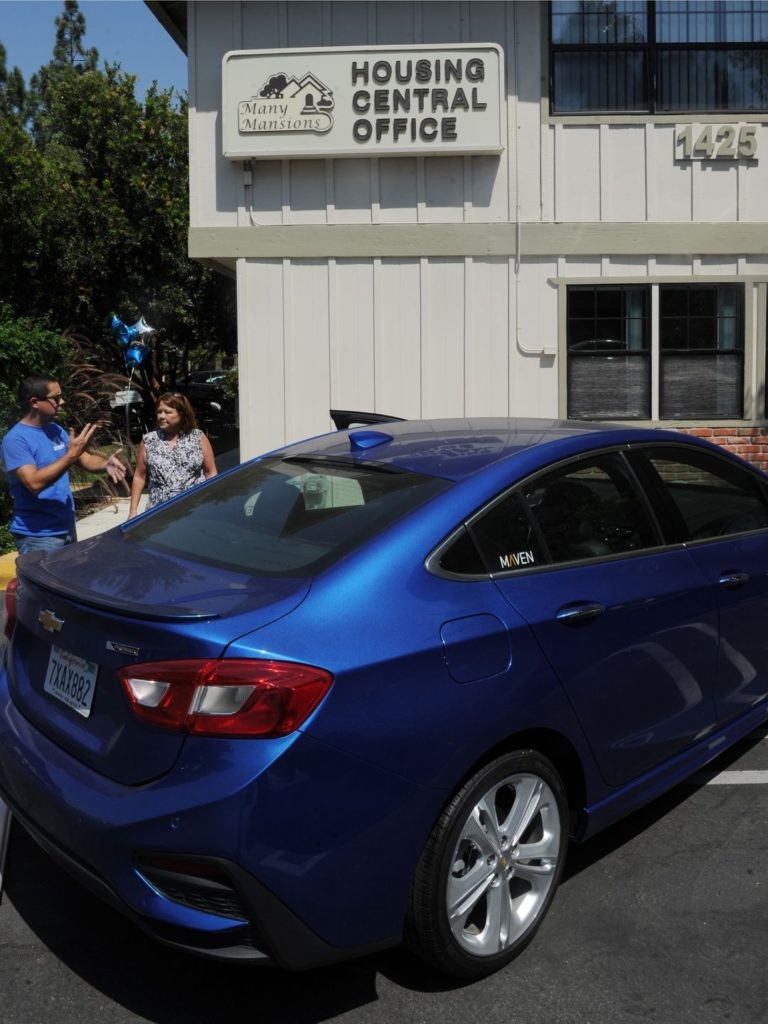General Motors’ Maven program aimed to revolutionize urban transportation by providing car-sharing services in various cities. While the program is no longer operational, its initiatives left a mark, particularly in communities seeking affordable transportation solutions. One such initiative was launched in partnership with Many Mansions, a Thousand Oaks-based affordable housing organization. This article delves into the details of the Maven program at Many Mansions, exploring how it addressed transportation challenges for residents and offering insights into the scale of this car-sharing service.
Maven, launched by General Motors, was designed to offer convenient and cost-effective car access without the burdens of ownership. In August 2017, Many Mansions partnered with Maven to bring this service to its residents at Esseff Village and Villa Garcia apartments in Thousand Oaks. The initial launch featured a Chevrolet Cruze stationed at the shared parking lot of these properties, marking the beginning of an innovative transportation solution for the community.
The core concept of Maven at Many Mansions was to provide residents with on-demand access to a vehicle for a nominal hourly fee. Priced at $8 per hour, the service was inclusive of gas and insurance, making it an attractive alternative to car ownership for low-income residents. Rick Schroeder, President of Many Mansions, highlighted the program’s alignment with the needs of their residents, many of whom required occasional vehicle access for essential tasks like shopping and medical appointments but could not afford the costs associated with owning a personal car.
“Most of our residents do not have a car and simply lack transportation but need it for shopping, doctor’s appointments,” Schroeder explained. “But they only need cars periodically, a few hours a day throughout the week. This is a good way of giving them access to a car without bearing the expense of owning a car.”
The initiative at Many Mansions was unique as it represented General Motors’ first foray into offering the Maven car-sharing program to an affordable housing community. This partnership was initiated when a Many Mansions employee recognized the potential benefits of Maven for lower-income communities and reached out to General Motors. The plans for implementation began in May 2017, culminating in the August launch.
Initially, the Maven program at Many Mansions launched with one Chevrolet Cruze. However, the vision extended beyond a single vehicle. Many Mansions expressed aspirations to expand the program, potentially adding more vehicles and extending the service to the wider Ventura County community, contingent on the success of the pilot program at Esseff Village and Villa Garcia. This ambition reflected a desire to scale the impact of the car-sharing service and address broader transportation needs within the region.
For residents like Rhonda Sloane, the Maven program offered a practical solution to transportation challenges. Sloane, an Esseff Village resident, faced issues with her high-mileage personal vehicle and found Maven’s affordability and on-site convenience highly appealing. Similarly, Rosanna Allen, another resident, highlighted how the program would facilitate essential errands and activities that were previously difficult due to a lack of affordable transportation. Allen estimated she would utilize the service “eight to 10 times a month,” underscoring the significant role even a single shared vehicle could play in improving residents’ lives.
The operational aspect of Maven at Many Mansions involved residents scheduling vehicle use through a mobile application. While most residents had smartphone access, Many Mansions committed to assisting those without the technology to ensure equitable access to the service. Reservations could be made for a minimum of one hour and up to 28 days, offering flexibility to accommodate various transportation needs.
Beyond immediate convenience, the Maven program at Many Mansions also presented a broader implication for urban planning and affordable housing development. Rick Schroeder pointed out that car-sharing initiatives like Maven could potentially reduce the need for extensive parking infrastructure in affordable housing communities. By providing residents with shared vehicle access, the program suggested a model for more efficient land use and reduced construction costs associated with parking provisions.
In conclusion, while the GM Maven program itself has ceased operations, its initiative at Many Mansions serves as a notable example of how car-sharing can address transportation challenges in affordable housing communities. Although initially launched with a single car, the program held the potential for expansion and highlighted the positive impact of even a limited number of shared vehicles on residents’ mobility and quality of life. The Maven and Many Mansions partnership underscored the viability of car-sharing as a component of affordable and sustainable urban living.
